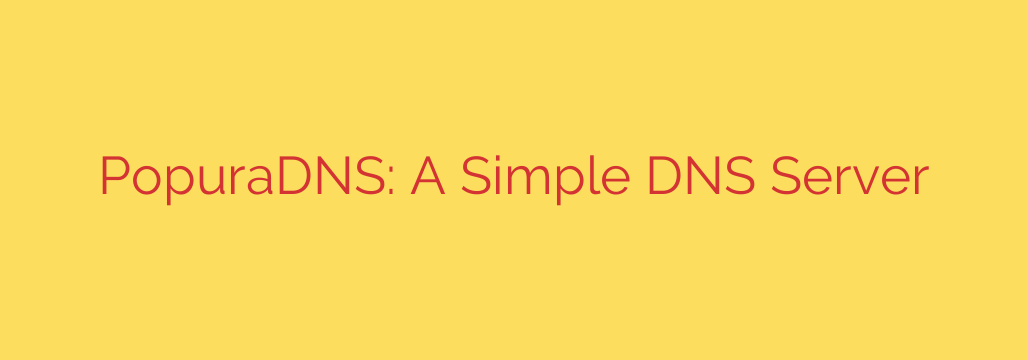
PopuraDNS: A Guide to Running Your Own Simple and Lightweight DNS Server
The Domain Name System (DNS) is one of the foundational pillars of the internet, silently translating human-readable domain names like www.example.com into machine-readable IP addresses. While most users rely on public DNS servers provided by their ISP, Google, or Cloudflare, there is a growing movement towards self-hosting DNS for greater control, privacy, and performance. This is where a tool like PopuraDNS enters the picture, offering a minimalist approach to a complex task.
If you’re a developer, a tech hobbyist, or a network administrator looking for a straightforward solution, understanding what a lightweight DNS server can do for you is essential.
What is PopuraDNS?
PopuraDNS is a minimalist, open-source DNS server designed with one primary goal in mind: simplicity. Unlike traditional, feature-heavy DNS servers like BIND, which can be notoriously complex to configure, PopuraDNS provides core DNS functionality in a lightweight, easy-to-manage package. It’s built for individuals and small networks that need a reliable DNS solution without the steep learning curve or extensive overhead.
Think of it as the perfect tool for a home lab, a local development environment, or a small office network where you want to take charge of your own domain name resolution.
Key Benefits of a Self-Hosted DNS Server
Why would you want to run your own DNS server in the first place? The advantages are significant, especially when it comes to privacy and customization.
- Unmatched Network Control: By running your own DNS, you become the gatekeeper of your network’s traffic. You can create custom domain names for local devices (e.g.,
nas.homeorprinter.lan), block access to specific websites, and redirect traffic with precision. - Enhanced Privacy and Security: When you use a public DNS server, your provider can see every website you visit. Self-hosting your DNS keeps your browsing history private and within your own network. You can also implement custom blocklists to prevent devices from connecting to known malicious domains, phishing sites, or ad servers.
- Improved Performance: A local DNS server can cache frequently accessed domain lookups directly on your network. This means that subsequent requests for the same site are resolved almost instantly, which can lead to a snappier browsing experience.
- A Powerful Learning Tool: For those interested in networking, setting up and managing your own DNS server is an invaluable educational experience. It demystifies a critical piece of internet infrastructure and provides hands-on knowledge.
Core Features That Make PopuraDNS Stand Out
PopuraDNS is not trying to compete with enterprise-grade solutions. Instead, it focuses on doing a few things exceptionally well.
- Minimalist by Design: The core philosophy is to provide essential DNS functions without the bloat. It handles standard record types (like A, AAAA, CNAME, MX) efficiently, making it fast and resource-friendly.
- Simple, Human-Readable Configuration: One of the biggest hurdles with DNS software is a complex configuration. PopuraDNS uses a straightforward configuration file that is easy to understand and modify, even for those new to DNS management.
- High Performance: Built with modern programming practices, PopuraDNS has a very small memory footprint and is incredibly fast at resolving queries it’s authoritative for or has cached. It’s ideal for running on low-power hardware like a Raspberry Pi.
- Cross-Platform Compatibility: It is designed to run on various operating systems, including Linux, macOS, and Windows, offering flexibility for any environment.
Practical Use Cases and Security Tips
So, how can you put a simple DNS server to work? Here are a few practical scenarios:
- Local Development Environment: As a developer, you can use PopuraDNS to create custom local domains like
.devor.local. This allows you to run multiple projects on your machine (e.g.,project1.dev,api.project1.dev) and access them with memorable names instead oflocalhost:portnumbers. - Network-Wide Ad and Tracker Blocking: By configuring PopuraDNS as the primary DNS server on your router, you can block ads and trackers for every device on your network. Simply point known ad-serving domains to a non-routable IP address in your configuration file. This is more effective than browser plugins, as it covers all devices, including smart TVs and mobile phones.
- Creating a Secure “Walled Garden”: In a home with children or for specific IoT devices, you can create a highly restrictive environment. Configure the server to only resolve a whitelist of approved domains, effectively blocking access to the rest of the internet for designated devices.
Is PopuraDNS Right for You?
If you are managing a large corporate network or require advanced features like DNSSEC validation and complex zone transfers, a more robust solution like BIND or Unbound may be more appropriate.
However, if you are a developer, a power user who values privacy, or someone managing a small-scale network, PopuraDNS offers a compelling and accessible alternative. It empowers you to take control of a fundamental internet service with minimal fuss. For anyone looking to build a more private, efficient, and customized network, exploring a simple DNS server like this is a worthwhile endeavor.
Source: https://www.linuxlinks.com/popuradns-simple-dns-server/








